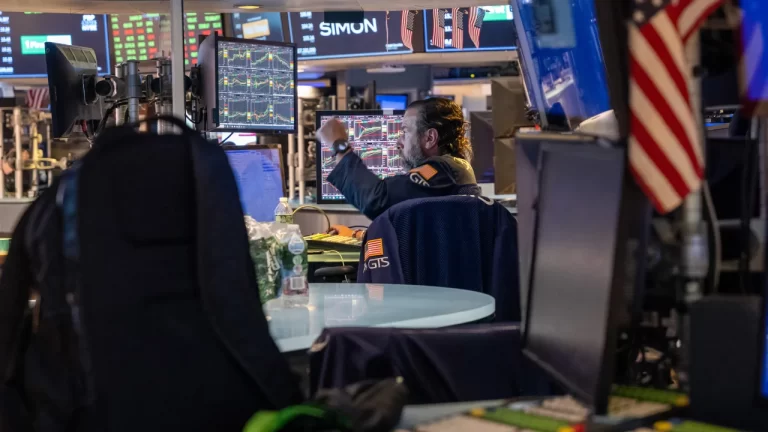Markets soared on Monday, just one day after the S&P 500 index landed in correction territory, ending the prior week 10% off its July zenith.
But Monday’s optimism could be short lived. Traders face a multitude of potentially scary market surprises lurking in the shadows this Halloween week. Wall Street is clearly spooked: The S&P 500 is still down by about 2.9% for October, and pacing toward its third negative month in a row. It would be the longest losing streak since the start of the pandemic in 2020.
The Dow is also on pace to end the month 1.6% lower. The Nasdaq Composite is 2.7% lower. CNN’s Fear and Greed Index, which tracks seven indicators of market sentiment in the United States, remained in the “fear” zone despite Monday’s market rally.
Here’s what’s causing the market fears:
High bond yields
Surging yields have contributed to one of the worst periods for bond market performance in history and pressured equity markets. 10-year Treasury yields are flirting with 5% for the first time since 2007, before the global financial crisis.
Although rates have retreated a bit from recent highs, it’s clear that we’re in the middle of a paradigm shift, said Rob Almeida at MFS Investment Management. It’s unlikely that yields will return to pre-pandemic lows, he said.
For American consumers, an elevated 10-year Treasury yield means financial pain, because it serves as a benchmark rate for a variety of consumer borrowing. That means more costly car loans, credit card rates and even student debt. It also means more expensive mortgage rates.
Like an evil witch, yields have mounted “a broom to the moon,” said Jason Pride, chief of investment strategy & research at Glenmede.
Higher yields on Treasuries put pressure on equity markets. Additionally, he wrote, “elevated yields are economically restrictive for businesses, as returns on new projects and expansions must be sufficient to cover the increased cost of funding.”
The Fed
The Federal Reserve will announce its next interest rate decision Wednesday, Nov 1. Inflation has begun to stabilize, with annual consumer price growth falling to 3.7% from the 9.1% high it hit last year, but the labor market has remained stubbornly resilient.
The majority of investors don’t believe the Fed will raise rates this week, but until the labor market has cooled considerably more and inflation rates drop back to the Fed’s 2% target, the option of future rate hikes remains on the table, haunting investors.
Mixed economic data has left the Fed in a holding pattern, said Erik Weisman, chief economist at MFS Investment Management, and so it’s unlikely investors will hear anything this week that leaves them satisfied.
“While the market would be delighted to learn something new concerning the expected timing and scope of future rate cuts or the ‘end-game’ for quantitative tightening,” he said, “this meeting is unlikely to provide much illumination on these fronts.”
Geopolitical strife
The Israel-Hamas war, which began in early October, initially rattled global financial markets, sending stocks tumbling, the Israeli shekel sliding and oil prices climbing. Although immediate worries appear to have subsided, investors remain on edge. A prolonged war could drive prices higher and hurt the global economy.
“While geopolitics typically has a short-lived direct market impact, the indirect impacts via inflation and economic growth can be more persistent,” said Seema Shah, chief global strategist at Principal Asset Management.
Continuing war between Russia and Ukraine and growing tensions between the US and China are also spurring fear among investors.
Oil prices fell on Monday but analysts at LPL Research wrote in a note on the same day that “the current geopolitical landscape is as dangerous as it has been in decades, and the risk of a spike in oil prices has increased.”
The note echoes the warnings issued by JPMorgan Chase CEO Jamie Dimon during his company’s earnings call earlier this month. “Now may be the most dangerous time the world has seen in decades,” he said.
Mixed tech earnings
Investors will pore over Apple’s third-quarter earnings report on Thursday for any information about the outlook for Big Tech, especially after tech stocks have had a decidedly mixed bag of earnings so far this quarter.
Amazon was a huge winner. The e-commerce giant reported revenue last week of $143.1 billion for the quarter ending in September, marking a 13% increase from the same period last year and beating analysts’ estimates.
The company reported quarterly profits of $9.9 billion, also beating estimates. But others weren’t so lucky.
Shares of Meta slid last week after the Facebook parent company reported that advertising revenue had been soft this quarter. While Meta beat expectations and posted significant year-over-year quarterly revenue gains of 23%, Wall Street worried about its Reality Labs division, which lost $3.7 billion.
Google-parent Alphabet reported last week that it fell short in its cloud business, causing shares of the company to drop precipitously. Alphabet notched its largest stock decline since March 2020 on the news.
— CutC by cnn.com


